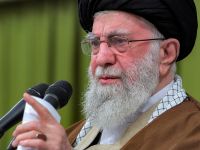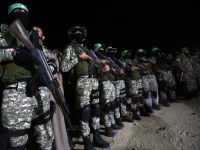An Egyptian court on Tuesday acquitted a former prime minister and an ex-interior minister of corruption charges in a retrial, the latest reversal of verdicts against officials who served under dictator Hosni Mubarak.
Ex-premier Ahmed Nazif and former Interior Minister Habib al-Adly were sentenced to jail after Mubarak's 2011 overthrow for a deal to import license plates from German company Utsch at an exorbitant price.
An appeals court overturned the suspended sentence for Nazif and the five-year prison term for Adly, and ordered the retrial.
A representative of Utsch and a former finance minister under Mubarak were also sentenced in the first trial but were not included in the appeal because they were tried in absentia.
Several Mubarak-era officials, including the ousted strongman himself, have been acquitted in retrials on charges of corruption and involvement in the murder of anti-Mubarak protesters.
Meanwhile, some protest leaders who spearheaded the 18-day revolt against Mubarak have been jailed on charges of illegal protest over the past year.
Adly was cleared of murder charges in a separate retrial with Mubarak in November that also saw charges against the former president dropped.
They had initially been sentenced to life in prison.
A lawyer for Adly said that the former interior minister faced one remaining trial which is expected to reach a verdict next month.
He has served his three-year sentence from another corruption trial, the lawyer Essam al-Batawy said.
Meanwhile, Egyptian President Abdel Fattah al-Sisi signed off on an anti-terrorism law that gives authorities more sweeping powers to ban groups on charges ranging from harming national unity to disrupting public order.
The move, announced in the official gazette, is likely to increase concerns among human rights groups that the government has rolled back on freedoms gained after the 2011 uprising.
Authorities have cracked down hard on the Islamist, secular and liberal opposition alike since then army chief Sisi toppled President Mohammed Morsi of the Muslim Brotherhood movement in 2013.
According to the government's gazette, the law enables authorities to act against any individual or group deemed a threat to national security, including people who disrupt public transportation, an apparent reference to protests.
Loose definitions involving threats to national unity may give the police, widely accused of abuses, a green light to crush dissent, human rights groups say.
Since taking office in 2014, Sisi has identified Morsi's Muslim Brotherhood as a threat to national security.
He has linked the Brotherhood, the region's oldest Islamist grouping, with far more radical groups, including one based in Sinai that supports the Islamic State of Iraq and Syria (ISIS), allegations it denies.
Hundreds of supporters of the Brotherhood, which says it is a peaceful movement, have been killed and thousands arrested in one of the toughest security crackdowns in Egypt's history.








